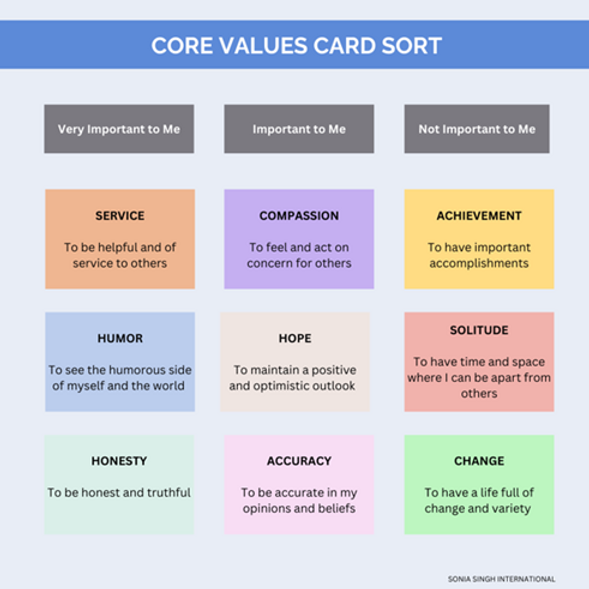Harnessing Core Values for Success
Feb 15, 2024
This article is provided courtesy of theleanmag, a content partner of the Operational Excellence Society.
Imagine steering a ship in tumultuous seas without a compass—this is like leading a business without core values guiding the way. You might eventually achieve your goals, but it might take a long time and involve unnecessary and costly detours.
In a survey conducted by the Economist Intelligence Unit, 90% of CEOs and CFOs who were interviewed believed that culture was important at their firms, with 92% stating that they believed improving their firm’s corporate culture would improve the value of the company. Yet, only 15% said their company’s corporate culture was where it needed to be. These figures reveal a disconcerting gap between understanding the importance of values and effectively aligning them with leadership strategy.
Values are more than lofty ideals; they are the strategic foundation that can make or break the trajectory of leadership success. A leader’s ability to infuse their values into every decision and direction taken is not merely a noble pursuit but a strategic imperative. It creates coherence between vision and action, builds trust within the team, and lays the foundation for sustainable success. Consider the remarkable turnaround stories of businesses that were once floundering but, through value-centric leadership, reached pinnacles of industry dominance. Similarly, recall the downfall of giants that lost sight of their moral compass, only to find themselves mired in scandal and disrepute.
In the journey toward strategic excellence, a leader must first look inward. The process starts with self-awareness, extends to values alignment, and culminates in strategic success that’s not only measured in profit margins but also in the positive impact on the workforce, customers, and society at large. The stories of leadership triumph and downfall both serve as powerful lessons: to lead with impact, one must first lead with values.
Aligned Values Lead to Strategic Success
When a leader understands and aligns their actions with their and the company’s core values, the direction becomes clearer, and the workforce more cohesive. A Korn Ferry survey found that companies with leaders who focus on aligning their values with their leadership styles outperform their competitors in profitability by as much as 2 to 1. This alignment instills a sense of trust and authenticity within the team, empowering everyone to act in alignment toward common goals.
One of the most celebrated examples of a leader whose alignment with their values led to significant strategic success is Satya Nadella, CEO of Microsoft. When Nadella took over in 2014, Microsoft was perceived as being in decline, struggling with internal competition and a series of failed products. Nadella shifted the company culture from one that knew everything to one that wanted to learn everything, in line with his personal belief in the power of a growth mindset, a concept that involves learning from the past and continuously evolving.
He championed the idea of ’empathy’ as a core value, not only as a moral compass but also as a business strategy to better understand customer needs and create more personal computing experiences. Under his leadership, Microsoft made a dramatic turnaround, reinventing itself and its products, leading to a tripling of the company’s stock price in just three years. Nadella’s value-driven approach also led Microsoft to focus on cloud computing and artificial intelligence, positioning the company at the forefront of these technologies.
Misalignment and Its Consequences
In contrast, an example of misalignment can be observed in the case of former Wells Fargo CEO John Stumpf. The company culture under his leadership seemed to emphasize sales and profits at the expense of ethical behavior and customer satisfaction. This misalignment of values culminated in a scandal in 2016, where it was revealed that thousands of Wells Fargo employees had created millions of fraudulent savings and checking accounts on behalf of their clients without their consent.
The scandal was, in part, attributed to the immense pressure on employees to meet unrealistic sales targets. This pressure reflected a leadership culture that placed value on outcomes rather than ethical processes. The aftermath was severe: Wells Fargo faced millions in fines and settlements, significant reputational damage, and a damaged company culture that would take years to rebuild. Stumpf resigned in disgrace, and the bank’s recovery from the scandal is an ongoing challenge, showcasing the devastating effects of a leader’s values not aligning with ethical business practices and customer well-being.
Identifying Your Core Values as a Leader
In the quest for leadership success, identifying your core values isn’t just an introspective exercise—it’s a critical step towards ensuring your actions resonate with authenticity and purpose. So, how do you sift through the layers of experiences and influences to uncover the values that define you as a leader? Here are some strategies to help you pinpoint your core values.
Reflect on Peak Moments:
Consider the moments in your career when you felt most fulfilled. What were you doing? Who were you with? Identifying these peak experiences can reveal what you value most. For example, if you felt a sense of accomplishment after mentoring a team member, ‘mentorship’ or ‘growth’ could be core values.
Look at Influencers:
Think about the leaders you admire and the qualities they embody that resonate with you. These qualities often reflect your aspirational values. For instance, if you admire a leader’s decisiveness or community involvement, these may hint at your own values of ‘decisiveness’ or ‘community’.
Envision Your Ideal Leader:
Imagine the leader you aspire to become. What characteristics does this ideal leader have? Listing these traits can offer a mirror to your values. If your ideal leader is compassionate and innovative, these are likely important values to you.
Understand Your Motivators:
Analyze what drives your decisions and actions as a leader. What are the non-negotiable elements that you’re not willing to compromise on? These are clear indicators of your core values. For example, if you are motivated by creating an inclusive work environment, ‘inclusion’ might be a core value.
Use Value Identification Tools:
There are many tools and assessments available that can help leaders identify their values. The ‘Values Card Sort’ is a physical or digital exercise that helps you prioritize different values. Online assessments can also provide a structured approach to discovering personal values.

Write a Personal Mission Statement:
Crafting a personal mission statement forces you to distill your beliefs and values into a concise declaration. This process can help to crystallize the values that are most essential to your identity as a leader. Here are a few examples: “To inspire others to achieve great things”, “To treat everyone I meet with kindness and respect”, and “Use my skills to make a positive impact on the lives of others.” Your personal mission statement should inspire and energize you.
Consistency Check:
Examine where your actions haven’t aligned with your stated values. This inconsistency can be very telling. It could indicate either a misunderstanding of your true values or areas where you need to grow to align your behavior with your values. You also want to see where your values overlap, or misalign, with your organization’s values.
Engage in Continuous Dialogue
Values aren’t static; they can evolve. Regularly engage in conversations with mentors, peers, and team members about values. This dialogue can provide new insights and help to refine your understanding of your core values.
Once you have a clearer picture of your core values, it’s important to articulate them to your team and incorporate them into your leadership strategy. Remember, identifying your core values is the first step; living them out in your daily actions and decisions is what ultimately shapes your influence and success as a leader.
The journey to becoming a leader of impact is paved with the bricks of self-awareness and values alignment. By identifying and living out your core values, you set a standard not just for yourself, but for your organization. It’s these values that will guide your decisions, inspire your team, and resonate with your customers. They are the silent partners in your leadership, informing your strategy and whispering the path forward during times of uncertainty.
Call to Action
Take a moment to reflect on your leadership approach and ask yourself if your values are at the forefront of your strategic vision. Consider this an invitation to delve deeper into your leadership compass, to realign and commit to the values that define your true north. The call to action is simple yet profound: Identify your values, share them boldly, and lead with the kind of purpose that not only reaches targets but also touches lives. Your strategic success as a leader is not just about what you accomplish, but about who you become in the process.
About the Author
Sonia K. Singh is the founder and principal of Sonia Singh International LLC, a leadership coaching and training company, managing partner of the consulting firm MPlus, and an adjunct professor at the University of San Francisco.
As the former Culture Leader for a Fortune 5 company and a Transformation Leader for many years, Sonia has helped organizations collectively save over $30M.
Over the past decade, Sonia has trained and coached over 2000 emerging and experienced leaders in developing key leadership competencies.
Original Article: https://opexsociety.org/body-of-knowledge/harnessing-core-values-for-success/
Stay In Touch.
Subscribe to our newsletter and exclusive Leadership content.
We respect your privacy and won’t spam your inbox


